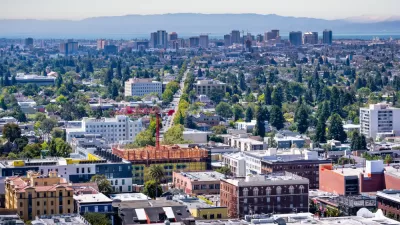The parking reform movement has a major new feather in its cap: the Toronto City Council has this week adopted sweeping changes to the parking requirements of the city's zoning bylaws.

The Toronto City Council this week adopted Zoning Bylaw Amendments that will remove most minimum parking requirements for new developments, according to a press release published by the city of Toronto. Parking maximums have also been added.
The city reports that the changes to the city's parking requirements align with goals set by its climate action strategy, TransformTO, approved in 2017, and the Provincial Policy Statement and the Growth Plan, adopted in 2019.
An article by Erin Nicole Davis for Storeys provides more details about the expected impact of the drastic parking reforms adopted by the fourth-most-populous city in North America.
Part of the reasoning behind the reforms is a pattern of overbuilt parking in new residential developments. According to Davis, "The Residential Construction Council of Ontario (RESCON) says data shows that in new condo projects, an average of 33% of parking stalls were left unsold. One builder, according to RESCON, had 90% still available for sale as a building neared construction."
RESCON also estimates that the price of building a parking spot has increased dramatically in recent years—from $80,000 to $165,000 in three years.
Planetizen shared news that Toronto was heading toward a historic moment in parking reform in November, but Toronto announced the potential for parking reforms [paywall] back in February.
Toronto becomes the latest city to roll back parking requirements in 2021, joining San Diego, Boston, Denver, Minneapolis, and Berkeley—although Toronto's reforms are far more universal than many, but not all, of the cities on that list. Planners in Raleigh, St. Paul, and Dallas are also working on parking reforms, and could have legislation for approval relatively soon.
There's also a crowd sourced map of all the cities that have adopted parking reforms.
FULL STORY: Toronto Removes Parking Minimums for New Residential Developments

Manufactured Crisis: Losing the Nation’s Largest Source of Unsubsidized Affordable Housing
Manufactured housing communities have long been an affordable housing option for millions of people living in the U.S., but that affordability is disappearing rapidly. How did we get here?

Americans May Be Stuck — But Why?
Americans are moving a lot less than they once did, and that is a problem. While Yoni Applebaum, in his highly-publicized article Stuck, gets the reasons badly wrong, it's still important to ask: why are we moving so much less than before?

Research Shows More Roads = More Driving
A national study shows, once again, that increasing road supply induces additional vehicle travel, particularly over the long run.

Which US Rail Agencies Are Buying Zero-Emissions Trains?
U.S. rail agencies are slowly making the shift to zero-emissions trains, which can travel longer distances without refueling and reduce air pollution.

San Diego School District Approves Affordable Housing Plan
The district plans to build workforce housing for 10 percent of its employees in the next decade and explore other ways to contribute to housing development.

Lawsuit Aims to Stop NYC’s ‘City of Yes’ Zoning Reforms
A lawsuit brought by local lawmakers and community groups claims the plan failed to conduct a comprehensive environmental review.
Urban Design for Planners 1: Software Tools
This six-course series explores essential urban design concepts using open source software and equips planners with the tools they need to participate fully in the urban design process.
Planning for Universal Design
Learn the tools for implementing Universal Design in planning regulations.
City of Moreno Valley
Institute for Housing and Urban Development Studies (IHS)
City of Grandview
Harvard GSD Executive Education
NYU Wagner Graduate School of Public Service
City of Cambridge, Maryland
Newport County Development Council: Connect Greater Newport





























